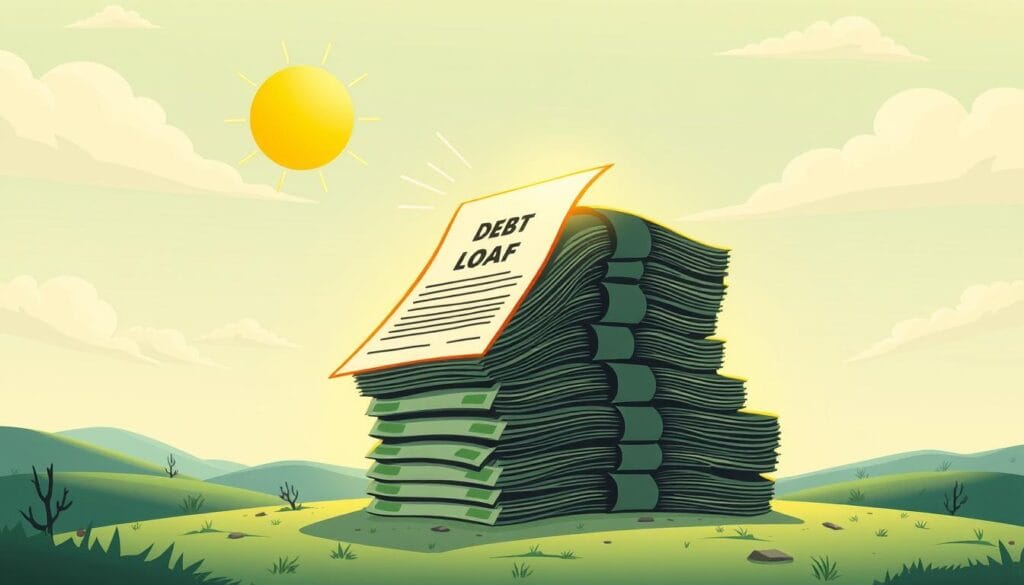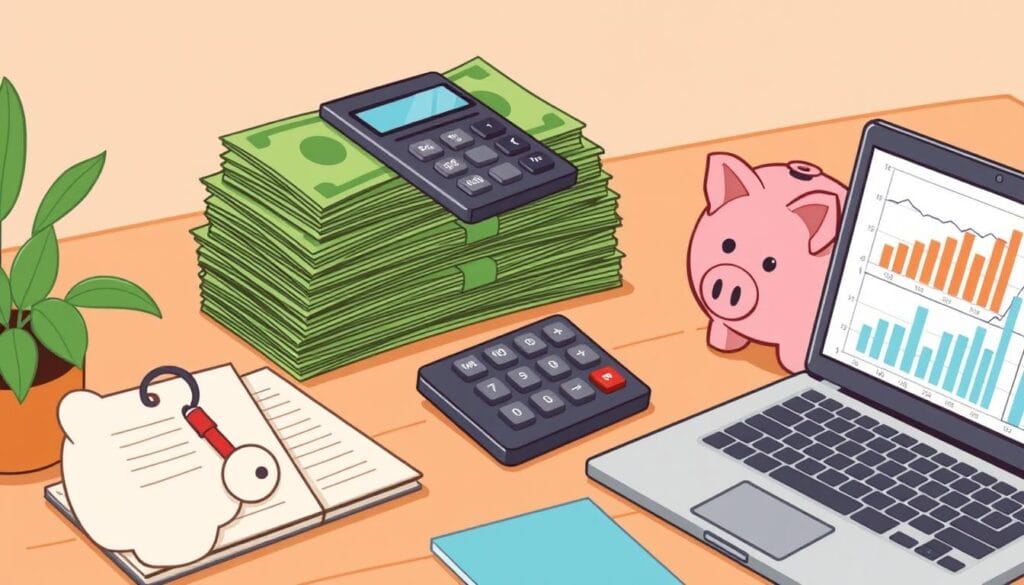Bill Consolidation Loan: Is It Right for You?

Are you juggling many debts with high interest rates? You’re not alone. Many in the U.S. face this challenge. A bill consolidation loan can help simplify your debt and save money on interest. It involves getting a new loan to pay off old debts, leading to one lower-interest monthly payment.
It’s key to know what a bill consolidation loan is and how it works. This loan combines multiple debts into one, often with a lower fixed interest rate. This can save a lot on interest payments over time. For example, switching a $25,000 debt from 7.5% to 6% interest can save $1,749.38 in interest.
Before getting a bill consolidation loan, consider the pros and cons. It can make managing payments easier and help you pay on time. But, it’s important to have a solid plan and realistic goals to avoid more debt. Knowing the benefits and drawbacks helps you decide if it’s right for you.
Table of Contents
Understanding Bill Consolidation Loans
Bill consolidation loans are a way to manage your debts. They combine several debts into one loan with a lower interest rate. This makes paying off your debt easier and can save you money.
To get a bill consolidation loan, you need a good credit score. A score of 690 or higher is usually required. But, a higher score means you’ll get a better interest rate. The rates for these loans are between 6% and 36%, and you can pay them back in one to seven years.
When looking for a bill consolidation loan, consider the interest rate, loan term, and any fees. There are different types of loans, like balance transfer credit cards and personal loans. Consolidating your debt can make your payments simpler and save you money. For example, a loan with a 13.15% rate can be cheaper than credit card rates of 23.37% to 27.7%.
Benefits of Bill Consolidation Loans
Bill consolidation loans offer many benefits. One key advantage is the simplification of payments. You can merge multiple debts into one, making a single monthly payment. This makes it easier to manage your finances and reduces the chance of late payments.
Another benefit is the chance for lower interest rates. Consolidating high-interest debts can save you money on interest over time. For instance, consolidating $25,000 at 7.5% interest to 6% can save you $1,749.38 in interest.
Some of the main benefits of bill consolidation loans include:
- Simplified payments: Combine multiple debts into one loan with a single monthly payment
- Potentially lower interest rates: Save money on interest payments over time
- Improved credit score: Make timely payments to improve your credit score
Debt consolidation loan rates vary based on the lender and your credit score. A good credit score can help you get lower interest rates and better terms. It’s important to compare different lenders to find the best deal for you.
Understanding the benefits of bill consolidation loans helps you decide if it’s right for you. It offers simplified payments, lower interest rates, and can improve your credit score. A bill consolidation loan can be a valuable tool for managing your debt and achieving financial stability.
| Loan Type | Interest Rate | Loan Term |
|---|---|---|
| Personal Loan | 6.94% – 25.29% | 24 – 144 months |
| Home Equity Loan | 4.99% – 12.99% | 60 – 360 months |
Drawbacks of Bill Consolidation Loans
Before you get a bill consolidation loan, know the downsides. Fees and costs like origination and balance transfer fees can be high. These can be 1% to 6% of the loan amount. Missing payments can also hurt your credit score, affecting you for years.
Some major drawbacks of bill consolidation loans are:
- Fees and costs: Upfront origination fees, balance transfer fees, and late fees can add up quickly.
- Risk of accumulating more debt: If you don’t address the underlying issues that led to your debt problems, you may be at risk of accumulating more debt.
- Impact on credit score: Missing payments or high credit utilization can negatively impact your credit score.
Bill consolidation loan rates vary a lot. A good credit score can get you a lower rate, saving money. But, those with low scores might face higher rates, making it harder to pay off the loan.
In summary, bill consolidation loans can help with debt, but there are downsides. These include fees, the risk of more debt, and credit score impacts. By understanding these and looking for the best rates, you can choose wisely for your finances.
| Loan Type | Interest Rate | Fees |
|---|---|---|
| Personal Loan | 6.99% – 35.99% | Origination fees, late fees |
| Balance Transfer Credit Card | 0% – 25% | Balance transfer fees, late fees |
| Debt Consolidation Loan | 6% – 36% | Origination fees, late fees |
Who Should Consider a Bill Consolidation Loan?
Understanding who can benefit from a debt consolidation loan is key. People with many debts, those looking for financial stability, and those with steady income might find it helpful. This loan merges several debts into one with a lower interest rate, making just one monthly payment.
Those with high-interest debts, like credit card balances, and those juggling multiple payments should think about it. A debt consolidation loan can make managing debt easier and might save you money on interest. Having a steady income helps qualify for this loan, as it shows you’re a lower-risk borrower.

Knowing who should consider bill consolidation and the benefits of a debt consolidation loan helps make informed decisions. Always review the terms and conditions of any loan before deciding.
| Debt Management Option | Benefits | Risks |
|---|---|---|
| Debt Consolidation Loan | Simplified payments, potentially lower interest rates | May involve fees, requires steady income |
| Debt Settlement | Can negotiate reduction in total debt | May negatively impact credit score, involves fees |
How to Qualify for a Bill Consolidation Loan
To get a bill consolidation loan, you need to meet some basic requirements. These include a good credit score, which can vary by lender. Usually, a score of at least 700 is needed for a loan with a good interest rate. Some lenders might accept lower scores, but you’ll likely pay more in interest.
Before applying, check your credit report and score. This ensures you meet the lender’s standards. Your debt-to-income ratio should be 45% or less for a better chance of approval. It’s smart to list all your debts, including amounts, interest rates, and monthly payments before applying.
Here are important things to think about when applying for a bill consolidation loan:
- Credit score: A good to excellent score (690 to 850) can help you get approved and get lower interest rates.
- DTI ratio: Keeping your DTI ratio at 45% or less can help you get approved.
- Interest rates: Loan rates for bill consolidation can be from 6.99% to 35.99%, based on the lender and your credit.
Understanding how to qualify for a bill consolidation loan and knowing these key points can help you decide if it’s right for you.
| Lender | APR Range | Loan Amount |
|---|---|---|
| LightStream | 6.99% – 25.29% | $5K – $100K |
| Best Egg | 7.99% – 35.99% | $2K – $50K |
Steps to Obtain a Bill Consolidation Loan
To get a debt consolidation loan, you need to take a few steps. First, research and compare different lenders. Look at their interest rates, loan terms, and fees to find the best fit for you.
After picking a lender, gather the needed documents. This includes proof of income and credit reports. Make sure to read the loan terms carefully before signing. Understanding the process can make it easier to get a bill consolidation loan.
Researching Lenders
When looking for lenders, consider interest rates, loan terms, and fees. Compare offers from various lenders to find the best one for your situation. A debt consolidation loan can simplify your payments and possibly lower your interest rates.
Comparing Loan Offers
It’s important to compare loan offers to find the right one. Look for lenders with competitive rates and flexible repayment plans. Some lenders may also offer extra benefits like credit counseling or financial education.
Gathering Necessary Documentation
To apply, you’ll need to gather documents like income proof and credit reports. This helps the lender decide on your loan terms. By following these steps, you can manage your debt and improve your financial stability.
The table below outlines the main steps to get a bill consolidation loan:
| Step | Description |
|---|---|
| 1. Researching Lenders | Compare loan offers from different lenders |
| 2. Comparing Loan Offers | Look for competitive interest rates and flexible repayment terms |
| 3. Gathering Necessary Documentation | Provide income verification and credit reports to complete the application process |
By following these steps and considering your options carefully, you can find a debt consolidation loan that meets your financial goals.
Alternative Options to Bill Consolidation Loans
Looking into debt consolidation? It’s key to check out other choices before bill consolidation loans. These options might offer more flexibility, lower interest rates, or better support. If you’re juggling many debts, think about debt management plans, personal loans, or credit counseling services.
Debt Management Plans
Debt management plans let you work with a credit counselor to pay off debts slowly. They can help lower interest rates or monthly payments with creditors.
Personal Loans
Personal loans can merge your debt into one loan with a fixed rate and term. But, they might have higher rates than bill consolidation loans. Always compare rates before choosing.
Credit Counseling Services
Credit counseling services offer help to manage your debt and plan to be debt-free. They’re great if you’re struggling to pay or need help with creditors.
Some other choices instead of bill consolidation loans are:
- Balance transfer credit cards with 0% introductory APR
- Home equity loans or lines of credit with lower interest rates
- Cash-out refinancing, which can give you a sum to pay off debts
Exploring these alternatives to bill consolidation loans can help you find the best fit for your finances. This way, you can make smart choices about loan rates and other financial aspects.
Tips for Using a Bill Consolidation Loan Wisely
Using a bill consolidation loan wisely is key to financial stability. First, create a budget that includes your monthly payments. This ensures you have enough for all your expenses.
Creating a Budget
A good budget helps manage your money well. Use the 50/30/20 rule to guide you. Allocate 50% for necessary expenses, 30% for fun, and 20% for savings and debt.
Making Payments on Time
On-time payments are vital to avoid extra fees and bad credit. Set up automatic payments to never miss a payment. Try to pay more than the minimum to clear your debt faster and save on interest.

Follow these tips to simplify your finances, cut down debt, and boost your credit score. Avoid new debt while paying off your loan for lasting financial health.
Real-Life Examples of Bill Consolidation Loans
Looking at real-life examples of bill consolidation loans is key. It shows how this strategy can help manage debt. For example, someone with many credit cards can combine them into one loan. This can lower their interest rate and make payments easier.
When you look at debt consolidation loan rates, think about how it might affect your credit score. Consolidation can offer quick relief but make sure it fits your long-term goals. Also, know that rates can be from 6.99% to 35.99% APR, and terms are usually 2 to 7 years.
Here’s a quick look at the good and bad sides of bill consolidation loans:
- Simplified payments and possibly lower interest rates
- Can improve your credit score over time
- There’s a risk of getting into more debt if not managed well
- It might affect your credit score during the consolidation process
| Loan Type | Interest Rate | Loan Term |
|---|---|---|
| Debt Consolidation Loan | 6.99% – 35.99% APR | 2 – 7 years |
| Personal Loan | 5.99% – 35.99% APR | 2 – 7 years |
| Credit Card Balance Transfer | 0% – 25.99% APR | 12 – 21 months |
By looking at real-life examples and understanding the pros and cons, you can decide if bill consolidation is right for you.
Frequently Asked Questions (FAQs)
Understanding bill consolidation loans is key. FAQs offer insights to help you make smart choices. One question is about the average interest rate, which changes based on the lender and your credit score.
What Is the Average Interest Rate?
The interest rate for bill consolidation loans varies. It can be between 6% and 36%. It’s important to compare rates from different lenders to find the best one.
Can I Consolidate Student Loans?
Yes, you can consolidate student loans. There are federal and private consolidation options. Think about the interest rates, repayment terms, and fees before deciding.
When looking into bill consolidation, consider these points:
- Interest rates and fees
- Repayment terms
- Credit score impact
- Debts you can consolidate, like credit cards or personal loans
Understanding these FAQs helps you make better financial choices. It lets you pick the best option for your situation.
| Loan Type | Interest Rate | Repayment Term |
|---|---|---|
| Bill Consolidation Loan | 6%-36% | 12-60 months |
| Personal Loan | 6%-36% | 12-60 months |
| Student Loan Consolidation | 4%-12% | 10-30 years |
Making the Right Decision
When thinking about a bill consolidation loan, it’s key to understand your financial health. Look at your income, expenses, debts, and credit score. This helps decide if a bill consolidation loan is right for you. Making the right choice can prevent more financial problems and help you reach stability.
Debt consolidation loan rates change based on the lender and your credit score. It’s important to compare rates and terms from various lenders. A lower interest rate can save you money and help you pay off debt quicker.
Assessing Your Financial Situation
To make a smart choice, you must evaluate your finances. This means checking your:
- Income and expenses
- Debts and credit score
- Financial goals and priorities
Consulting with a Financial Advisor
Talking to a financial advisor can offer great advice and support. They can help you understand the pros and cons of a bill consolidation loan. They might also suggest other options, like debt management plans or credit counseling services.
By carefully looking at your finances and getting advice from a financial advisor, you can make a well-informed decision. This can lead to financial stability.
Conclusion: Is a Bill Consolidation Loan Right for You?
Thinking about getting a bill consolidation loan? It’s important to think about your financial situation first. These loans might make paying bills easier and lower your interest rates. But, they can also have fees and might lead to more debt.
Final Thoughts
A bill consolidation loan might be good if you have many debts and want financial stability. But, you should really think about your situation and talk to a financial advisor. This way, you can make sure the loan fits your long-term financial plans and helps you get out of debt.
Next Steps to Consider
If you think a bill consolidation loan is right for you, start by looking into different lenders. Compare their offers and get ready with the needed documents. With careful planning and smart use, a bill consolidation loan can be a big help on your way to being debt-free.




